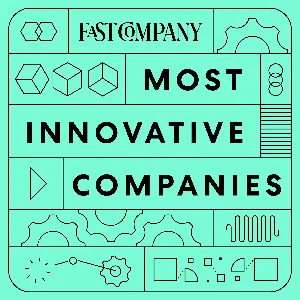Podcast Summary
The Transformative Power of Simplicity and Innovation: From gene therapy allowing an 11-year-old boy to hear for the first time, to a new spy thriller's intricate storytelling, simplicity and innovation transform science and entertainment.
Science continues to make remarkable strides in the field of gene therapy, as demonstrated by the story of an 11-year-old Moroccan boy named Isam Dam, who traveled to Philadelphia for a clinical trial to receive a new gene therapy that allowed him to hear for the first time in his life. This is a significant development for those born deaf, and it raises the question of whether deafness should be considered a condition that needs to be treated. The story of Isam's journey is just one example of the potential impact of gene therapy, and it highlights the importance of continued research and innovation in this area. Meanwhile, in the world of entertainment, FX's new international spy thriller, "The Veil," offers a complex and intriguing narrative about two women involved in a deadly game of truth and lies. The show's artful storytelling is a reminder that even the smallest parts serve a bigger purpose, and it's a testament to the power of simplicity in business operations. Mercury, a financial services company, exemplifies this principle by providing precision, control, and focus to ambitious companies, allowing them to perform at their best. In conclusion, the story of Isam Dam's miraculous hearing experience and the intrigue of "The Veil" demonstrate the transformative power of simplicity and innovation in both science and entertainment.
Gene Therapy for Deafness: Early Success Stories: Early success stories of gene therapy for deafness include at least six children, with one 11-year-old boy in the US experiencing mild to moderate hearing improvement. Long-term benefits are uncertain but the ability to hear natural sounds is already a significant achievement.
Gene therapy for deafness is making remarkable progress with early success stories emerging in the US and China. At least six children have undergone this treatment, with one 11-year-old boy in the US experiencing mild to moderate hearing loss in the treated ear. Several teams are racing to be first in demonstrating these results, with studies having started within the last year. The experience for these children is profound, with one girl reporting hearing sounds at night and being able to hear a bell ringing at school. Her hearing is currently estimated to be around 60-65%, allowing her to hear normal voices but not whispers. The long-term improvement of hearing is uncertain, but the ability to hear natural sounds already is considered a significant achievement.
Gene therapy for deafness: Adding a missing gene to ear cells: A new gene therapy for deafness aims to add a missing gene to ear cells, allowing the production of crucial chemical transmitters. Currently only suitable for 1-3% of those with inborn deafness, but ongoing trials may inspire further research.
A new gene therapy is being developed to help a small percentage of people who are born deaf due to a specific genetic mutation. This therapy involves adding a whole copy of the missing gene into people's ear cells, allowing them to produce the crucial chemical transmitter that's missing in their system. This therapy is not CRISPR, but a more classic form of gene therapy. It's currently only suitable for about 1-3% of those with inborn or congenital deafness, but ongoing trials may inspire and excite further research into gene therapies for other forms of deafness. Despite the potential of gene therapies, many fail in the marketplace due to the small patient population.
Market failure in gene therapies due to small patient populations: Small patient populations lead to market failure in gene therapies, but the allure of curing diseases with no existing treatments drives numerous biotech companies to enter the field
While gene therapies hold immense promise due to their ability to change or add DNA to human cells, creating a profound impact on medical treatment, many of these therapies face market failure due to small patient populations. This market failure doesn't deter the entry of numerous biotech companies, driven by the excitement of being at the forefront of this revolutionary technology and the potential to cure diseases with no existing treatments. The allure for scientists, many of whom are doctors, lies in the ability to cure patients with conditions like deafness, where there is currently no pill or pharmaceutical solution available. Despite the challenges, the pursuit of gene therapy continues to attract numerous competitors, driven by its potential to revolutionize medical treatment.
Considering the long-term implications of gene therapy for the deaf community: Gene therapy offers potential benefits for restoring hearing, but it's essential to consider ongoing needs and support for those who may not fully regain their hearing and the importance of continued access to language.
While the advancement of gene therapy to restore hearing for some children may seem like a miracle, it's important for ethicists and members of the deaf community to consider the long-term implications and support for those who may still require assistance. Quince, on the other hand, offers affordable and comfortable spring clothing options for those looking to update their wardrobe. During the discussion, Claire White from Vox shared her positive experience with Quince's spring collection, which includes organic cotton gauze tiered maxi dresses and European linen blazers. Quince aims to provide affordable luxury with free shipping and 365-day returns. Professor Theresa Lankmeier Burke, a full professor of philosophy at Gallaudet University and a member of the deaf community, discussed the ethical implications of gene therapy from a philosophical perspective. While she acknowledged the potential benefits, she emphasized the importance of considering the ongoing needs and support for those who may not fully regain their hearing. The recent news of gene therapy restoring hearing for some children has been met with excitement, but Professor Burke urged caution and emphasized the need for continued support and access to language for those who may still require it. Overall, it's crucial to consider the long-term implications of new technologies and the ongoing needs of those they impact.
Ensuring Language Access for Deaf Children: Technology can restore hearing, but language access is crucial for optimal development. Ethical considerations must prioritize language access for deaf children, especially in gene therapies.
While advancements in technology, such as cochlear implants, can provide hearing restoration for some children in the deaf community, it's crucial to ensure they also have access to a full language, preferably sign language. Language deprivation during the critical window of language acquisition can lead to permanent deficits in critical thinking and interpersonal abilities. Therefore, it's essential to prioritize and focus on the ethical implications of administering gene therapies for serious conditions, including deafness, and consider the potential impact on children's language development. The ultimate goal should be to ensure every deaf child has access to a language for optimal learning and development.
Respecting the Signing Deaf Community's Cultural and Linguistic Significance: The signing deaf community is a valuable and thriving cultural and linguistic group with unique ethical and cultural norms. Parents should be fully informed before deciding to cure their deaf children, and it's essential to support their choices while recognizing the importance of preserving the deaf community's human diversity.
The signing deaf community is a valuable and thriving cultural and linguistic group with unique ethical and cultural norms, contributions to art, history, and various domains including the sciences. It is essential to respect and preserve this community's human diversity, as many deaf individuals and families have deep roots and a deep reverence for their experience and community. While some parents may consider curing deafness for their children, it is crucial to understand the significance of the signing deaf community and its impact on human diversity. Parents should be fully informed before making such decisions, and it is necessary to support them in their choices while also recognizing the importance of the deaf community's preservation. The conversation surrounding parental rights and the community's future is complex, and there is no easy answer. However, it is crucial to continue the dialogue and work towards a solution that respects both individual rights and the value of human diversity.





